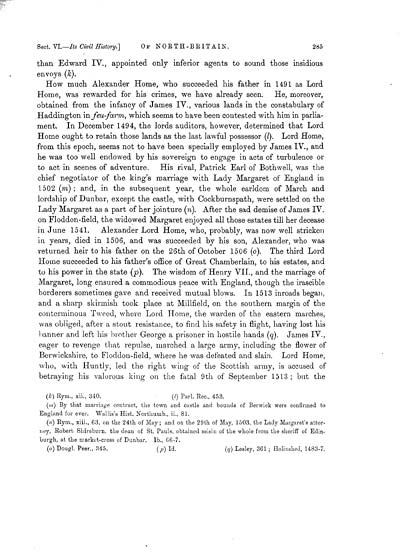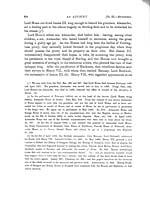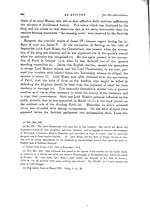Volume 3
(297) Page 285
Download files
Individual page:
Thumbnail gallery: Grid view | List view

285 than Edward IV., appointed only inferior agents to sound those insidious envoys (k). How much Alexander Home, who succeeded his father in 1491 as Lord Home, was rewarded for his crimes, we have already seen. He, moreover, obtained from the infancy of James IV., various lands in the constabulary of Haddington in feu-farm, which seems to have been contested with him in parlia- ment. In December 1494, the lords auditors, however, determined that Lord Home ought to retain those lands as the last lawful possessor (l). Lord Home, from this epoch, seems not to have been specially employed by James IV., and he was too well endowed by his sovereign to engage in acts of turbulence or to act in scenes of adventure. His rival, Patrick Earl of Both well, was the chief negotiator of the king's marriage with Lady Margaret of England in 1502 (m); and, in the subsequent year, the whole earldom of March and lordship of Dunbar, except the castle, with Cockburnspath, were settled on the Lady Margaret as a part of her jointure (n). After the sad demise of James IV. on Floddon-field, the widowed Margaret enjoyed all those estates till her decease in June 1541. Alexander Lord Home, who, probably, was now well stricken in years, died in 1506, and was succeeded by his son, Alexander, who was returned heir to his father on the 26th of October 1506 (o). The third Lord Home succeeded to his father's office of Great Chamberlain, to his estates, and to his power in the state (p). The wisdom of Henry VII., and the marriage of Margaret, long ensured a commodious peace with England, though the irascible borderers sometimes gave and received mutual blows. In 1513 inroads began, and a sharp skirmish took place at Millfield, on the southern margin of the conterminous Tweed, where Lord Home, the warden of the eastern marches, was obliged, after a stout resistance, to find his safety in flight, having lost his banner and left his brother George a prisoner in hostile hands (q). James IV., eager to revenge that repulse, marched a large army, including the flower of Berwickshire, to Floddon-field, where he was defeated and slain. Lord Home, who, with Huntly, led the right wing of the Scottish army, is accused of betraying his valorous king on the fatal 9th of September 1513 ; but the (k) Rym., xii., 340. (l) Parl. Rec., 453. (m) By that marriage contract, the town and castle and bounds of Berwick were confirmed to England for ever. Wallis's Hist. Northumb., ii., 81. (n) Rym., xiii., 63, on the 24th of May; and on the 29th of May, 1503, the Lady Margaret's attor- ney, Robert Shireburn, the dean of St. Pauls, obtained seisin of the whole from the sheriff of Edin- burgh, at the market-cross of Dunbar. Ib., 66-7. (o) Dougl. Peer., 345. (p) Id. (q) Lesley, 361; Holinshed, 1483-7.
Set display mode to:
![]() Universal Viewer |
Universal Viewer | ![]() Mirador |
Large image | Transcription
Mirador |
Large image | Transcription
Images and transcriptions on this page, including medium image downloads, may be used under the Creative Commons Attribution 4.0 International Licence unless otherwise stated. ![]()
| Caledonia, or, An account, historical and topographic of North Britain from the most ancient to the present times > Volume 3 > (297) Page 285 |
|---|
| Permanent URL | https://digital.nls.uk/74528668 |
|---|---|
| Description | Vol. III. |
|---|---|
| Attribution and copyright: |
|

